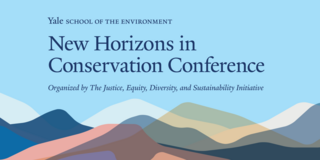JEDSI regularly holds New Horizons events to explore urgent issues in the environmental sector, with a focus on perspectives in environmental institutions, food insecurity and sovereignty, climate and energy, outdoor experiences, future leadership in the environmental movement, and more. To date, there have been five New Horizons in Conservation Conferences. These international, widely attended conferences are an opportunity to better understand drivers of progress and current challenges within the conservation field and assess critical gaps.
The New Horizons in Conservation Conference welcomes all students and professionals in the conservation field who seek to explore solutions to ongoing environmental challenges and/or challenges encountered by those working in the sector.
New Horizons also works to bolster the critical pipelines built by JEDSI pathway programs (Link is external) across the nation by providing spaces for participants to connect with peers, network, engage in hands-on professional development workshops and training, attend local field trips, and hear from leaders and visionaries in the field.
